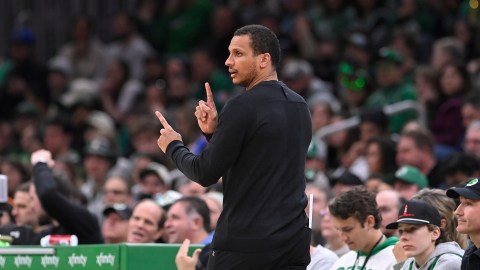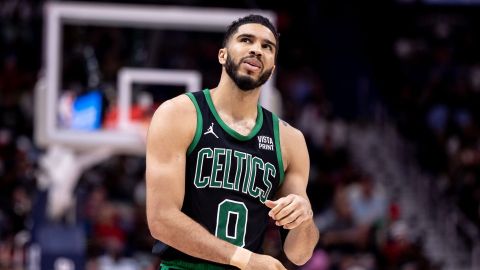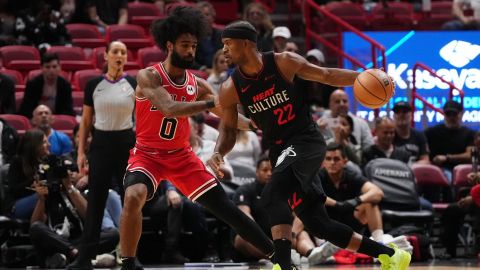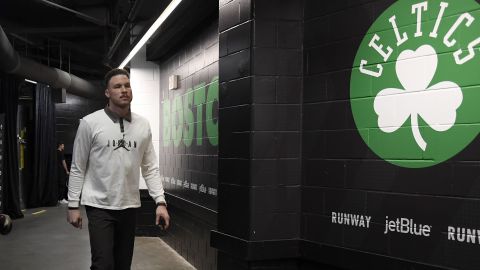 That lazy Danny Ainge. The NBA trade deadline came and went at 3 p.m. Thursday afternoon without the Boston Celtics’ president of basketball operations so much as picking up the phone to inquire about trading for Kevin Durant.
That lazy Danny Ainge. The NBA trade deadline came and went at 3 p.m. Thursday afternoon without the Boston Celtics’ president of basketball operations so much as picking up the phone to inquire about trading for Kevin Durant.
With an ideal opportunity to make the perfect move to put his team on a championship path for the foreseeable future, Ainge blew it.
Except, not exactly. In fact, not at all.
A day later, fans and uninformed observers are still steaming over the Celtics’ failure to make the slightest move at the deadline. Our first attempt to explain why Ainge’s inactivity wasn’t the worst thing ever fell on deaf ears, so we’re taking another crack at it.
In list form for the Buzzfeed generation, here are some of the reasons the Celtics were under no pressure to make a move Thursday.
They are under the luxury tax line. A lot has been made about how the Celtics are paying nearly $70.5 million in salaries this season for a measly 19-36 record. That’s a lot of dough for not a lot of wins. But the raw dollar figure doesn’t mean a whole lot. What matters is staying below the $71.7 million luxury tax threshold. That way, the Celtics are only on the hook for their actual payroll and don’t need to pay into the league’s tax kitty.
More importantly, they save themselves from another season counting against the impending “repeater” tax on teams that are in tax territory four out of five years. As it is, the Celtics could still add a couple of players on 10-day contracts in case of injuries and still stay out of the tax. That’s vital once the rebuilding job nears completion and the team actually wants to spend above the tax.
Nobody was taking Gerald Wallace or Keith Bogans. One of the loudest complaints has been that Ainge didn’t unload two of his most expensive, wasted contracts in Wallace and Bogans. The former has underperformed; even if he were playing well, the Celtics would still be eager to cut his $10 million salary over the next 2 1/2 years. The latter has been banished from the team after reportedly clashing with rookie coach Brad Stevens; the team still has to pay the $5 million guaranteed in his contract.
The Celtics don’t have a need for either of these guys, but here’s a news flash: Nobody else does, either. Getting rid of bad contracts requires taking on new contracts that might be worse. Ask yourself: If you were a rival general manager, would you give up even a second-round draft pick for Wallace or Bogans? No. Then why would anyone think Ainge could pull off such a deal?
Brandon Bass’ contract is not that expensive. As a consequence of last summer’s blockbuster trade, the Celtics had to take back some outsized existing contracts from the Brooklyn Nets. Kris Humphries’ $12 million and Wallace’s $30 million were the price of shedding the last remnants of the Paul Pierce era. Those unwieldy deals joined Jeff Green, due to earn $27 million over the next three years including this season, on a roster full of players making far more than their play warrants.
Somehow, perhaps just for the sake of brevity, Bass got lumped into that group. At 28 years old, the undersized power forward with a 15.2 player efficiency rating isn’t a franchise player. Ideally, he’d be on something more akin to the $5 million midlevel exception than his current $6.4 million price point. Still, Bass is not absurdly costly, and he’s just productive and useful enough to justify the cost, anyway. That was why he was the most movable piece for Boston at the deadline — other teams actually had a reason to want him. He never seriously considered leaving Boston as a free agent two years ago, so there’s no reason to believe he’ll be a locker room cancer before his contract expires in 2015, when the Celtics can re-sign him or let him walk with no remorse.
A lot of teams wish they were in Boston’s position. Aside from possibly the Philadelphia 76ers, no team is in better position with its future draft prospects than the Celtics. Ainge has nine first-round picks in the next five years at his disposal, with a 10th potentially in line if the Sixers make a shockingly fast recovery in their own rebuilding efforts. They could also have as many as eight second-round picks, which have become increasingly valuable given the new, more restrictive tax rules.
Not only can the Celtics rebuild with those draft picks, they can also rebuild by using those draft picks as trade assets. Their payroll drops from more than $70 million to almost $32 million by the summer of 2015, so they will have plenty of salary cap and luxury tax space to take on a high-priced star or two. Where have we heard about Ainge doing that once before?
Ainge did his work weeks ago. On Jan. 7, the Celtics sent Courtney Lee to the Memphis Grizzlies for Jerryd Bayless, whose $3.1 million deal is up on July 1, and a second-round pick. A week later, they shipped Jordan Crawford and MarShon Brooks to the Golden State Warriors, bringing back Joel Anthony, a protected first-round pick and a second-round pick. In one fell swoop (well, two fell swoops), they swapped roughly $17.2 million for $7.6 million — assuming Anthony picks up his $3.8 million player option for next season — and three draft picks.
That’s a heck of a haul. Had Ainge pulled off both of those deals on Thursday, he likely would have been hailed as the clear winner of deadline day. Instead, he got started more than a month early, putting himself in a position of strength on Thursday to let other teams attempt to make him an offer he couldn’t refuse. He never got such and offer, so he had no trouble refusing.
A playoff berth is highly unlikely. Some folks are worried that the lack of movement leaves the team with too many good players, who might be able to rally for a playoff berth. Such concerns are, most likely, unfounded. Rajon Rondo still isn’t playing back-to-back games as he recovers from a torn ACL. Avery Bradley continues to miss time with what appears to be the most severe sprained ankle in the history of modern medicine. Jeff Green keeps being consistently inconsistent.
With 27 games remaining, the Celtics are six games back of the eighth and final playoff spot in the Eastern Conference. Ahead of them are Atlanta, Charlotte, Detroit, Cleveland and New York, at least four of whom legitimately want to win and get into the postseason. Unless the Celtics suddenly wake up and go on a winning streak — something they have done just once since Dec. 16 — their lottery status is safe.
Ownership is rational and patient. A look around the league reveals that this factor is immensely invaluable, if often overlooked. The absolute converse is the Cleveland Cavaliers, who waffle between shooting for the playoffs and dismantling their roster depending on the way the wind is blowing off Lake Erie that afternoon. Yet Wyc Grousbeck, Stephen Pagliuca and Rich Gotham have shown that they get it.
The Celtics’ power structure has proven itself willing to pay the luxury tax in seasons when the team is contending for a title, while understanding that it’s not so simple as immediately shedding all that salary the moment the chase for a banner ends. They are paying $70 million this season — again, though, no luxury tax — but they also recognize that number could drop by more than $15 million at the end of the season and by almost $36 million in a year. By all indications, they haven’t demanded a knee-jerk deal like trading for Rudy Gay, nor do they expect Ainge to cut bait on their payroll obligations overnight. Therefore, Ainge didn’t approach the deadline feeling he had to make a deal just to prove to ownership that he’s doing his job.
Running a basketball team is a lot more complicated than many people assume. There were endless possibilities of moves Ainge could have made Thursday, but they weren’t necessarily good possibilities. Thankfully for the Celtics, Ainge is concerned with building a winning team, not satisfying a bunch of outsiders who want to see trades made just for the sake of shaking things up.
Have a question for Ben Watanabe? Send it to him via Twitter at @BenjeeBallgame or send it here.



